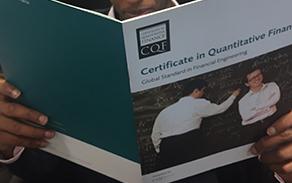What Is Quantitative Trading?

Quantitative trading is an area of finance where investment professionals use mathematical models and automated trading strategies to seek profitable opportunities in the financial markets. Quantitative trading plays an important role in proprietary trading, which is undertaken by investment banks and hedge funds for their own accounts. It is also prominent in market making, where participants provide liquidity and are focused on maintaining smooth operations, so that market participants can buy and sell assets in an orderly manner. Quantitative trading holds an advantage over discretionary trading in its data-driven methods and systematic approach to the markets that avoid emotional decision-making. However, quant trading can also be subject to the challenges of sudden market regime changes and crashes.
What Does a Quantitative Trader do?
Quant traders have expertise in implementing mathematical and statistical models to discover potentially profitable trading strategies and to execute trades. Quant traders work at investment firms, hedge funds, and banks, often as proprietary traders, or many trade independently for their own accounts. They are active across a wide range of asset classes, including equities, bonds, commodities, currencies, and derivatives. Specific areas of quantitative trading and research include:
- Valuation – where algorithms help determine an appropriate price for an asset based on prior information
- Execution – where algorithms manage buy and sell orders and execute trades
- Position Management – which entails analyzing an inventory of equities and options, for example, and managing the risk of those positions though buying, selling, or hedging.
The main inputs to quantitative trading systems include trading volume and prices over time, including price data at very small-time increments, known as tick data. In addition, these systems often make use of other types of data, from corporate information to alternative datasets, such as information gleaned from mobile devices, sensors, and satellites. Quant trading strategies are supported by backtesting, which is designed to model various scenarios and help to identify investing opportunities.
Over the past decade, machine learning and data science have had a significant impact on quantitative trading, and Python has become a language of choice for data analysis. This means that the journey to become a quant trader covers several fields simultaneously: mathematics, finance, and programming.
How to Learn Quantitative Trading
In terms of skills and education, a quant trader will often have a bachelor's degree and sometimes a master’s degree in a quantitative discipline such as mathematics, statistics, physics, computer science, engineering, operations research, or financial engineering. Quant traders also have expertise in the financial markets, and knowledge of research methods based on programming, data mining techniques, and statistical analysis. They will have a practical understanding of automated trading systems and may be capable of building their own systems. Many quant traders pursue professional education in relevant areas through online courses, such as the Certificate in Quantitative Finance (CQF).
The CQF Program and Quant Trading
The Certificate in Quantitative Finance (CQF) comprises six modules covering the mathematical foundations, financial expertise, Python programming skills, and knowledge of machine learning that are necessary for success in the financial industry. When it comes to the skills needed for a career in quant trading, delegates will come away with an understanding of how to use mathematical models to price assets, manage risk, predict market movements, implement algo trading strategies, and find arbitrage opportunities.
The CQF is ideally suited for trading professionals who wish to continue working full-time while enrolled in the program. The CQF is structured to provide a rigorous quantitative education, using a flexible learning approach and a robust online platform that can be accessed around the world.
Upon completion of the program, CQF alumni can keep their skills competitive for the rest of their career with access to the Lifelong Learning library, which includes 900+ hours of additional lectures, masterclasses, and the latest CQF qualification content. They can also participate in networking activities via the CQF Institute and make use of the CQF Careers Service, among many other long-term benefits of the program.
Learn more about Quant Trading Careers
Find out more about the skills needed and average salary for Quant Traders in the CQF Careers Guide to Quantitative Finance.




